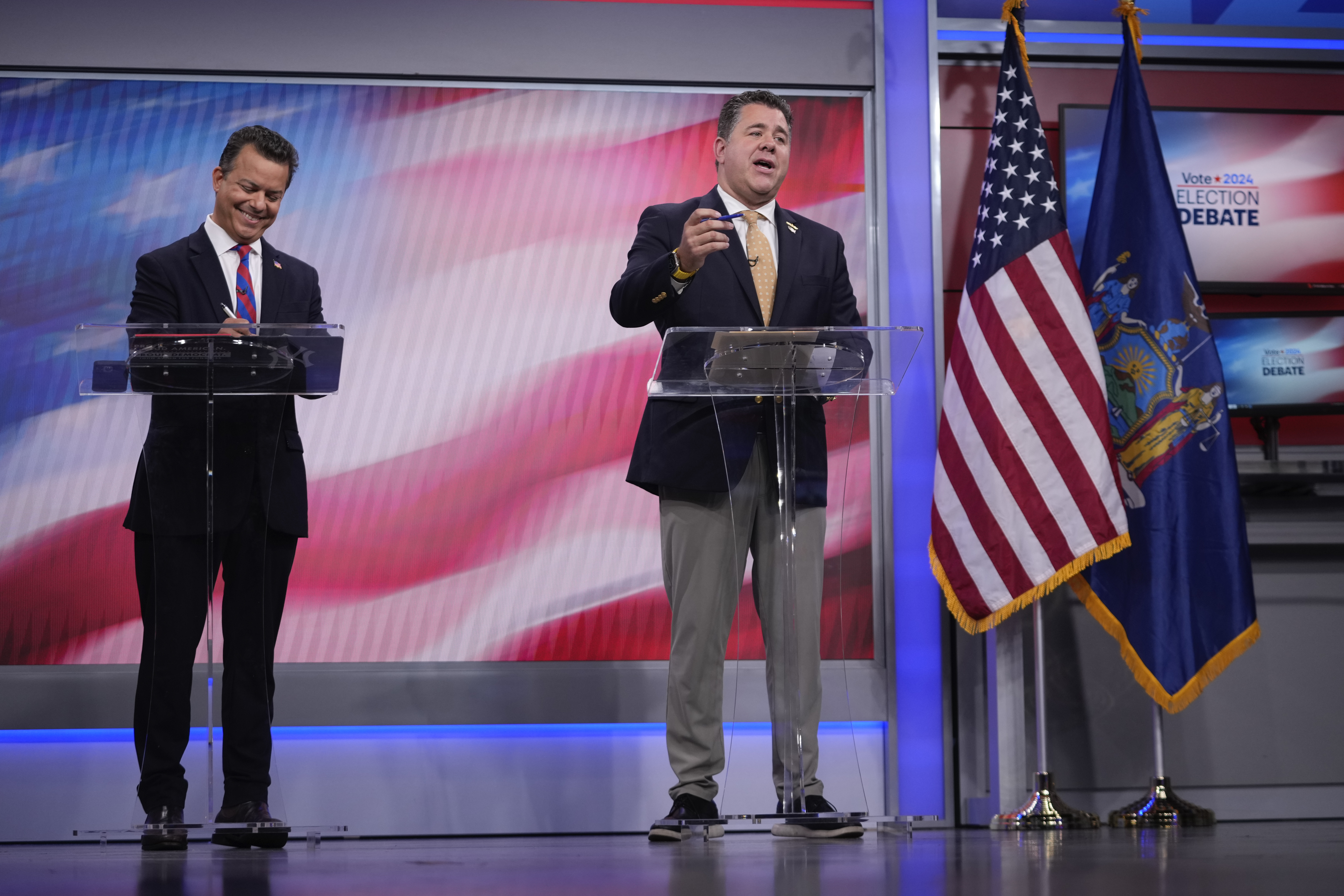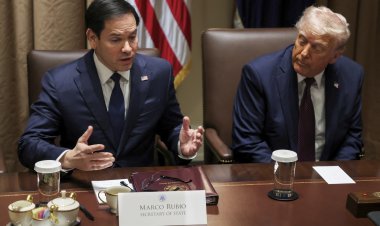Republicans Struggle with Messaging Strategy Regarding Biden's Climate Law
Democrats are strategically utilizing the Inflation Reduction Act to challenge moderate Republicans in competitive races. Meanwhile, the Trump campaign is experiencing increased pressure as well.

Former President Donald Trump has dismissed the Inflation Reduction Act as a "con job," vowing to "rescind all unspent funds" from it. Other prominent Republicans consistently criticize what they label as the Democrats' radical green energy initiatives.
However, the party has been finding it increasingly challenging to navigate pushback from industries and communities that stand to gain from the law, a gap that Democrats are exploiting.
In a Virginia House race, Democrat Missy Cotter Smasal called out Republican Rep. Jen Kiggans for trying to have contradictory positions regarding a local offshore wind project. Kiggans had initially delivered a speech in favor of the project but later voted for legislation that would have cut wind incentives from the IRA, according to Cotter Smasal during an October debate.
"That’s irresponsible," Cotter Smasal stated.
When the IRA passed in 2022, not a single Republican supported it. Now, as the law has catalyzed hundreds of billions of dollars in manufacturing projects nationwide, many GOP lawmakers find it increasingly complicated to explain their stance.
Recognizing the political risks of disregarding an economic opportunity for constituents, 18 GOP moderates signed a letter in August urging party leaders to retain some tax incentives from the law if they regain control in Washington.
In September, House Speaker Mike Johnson — who has often criticized the IRA — voiced support for a more measured approach, suggesting to bring down “a scalpel and not a sledgehammer” on the legislation.
Sen. JD Vance, the Republican vice presidential nominee from Ohio, has also showcased this divide. While addressing a Michigan audience, he referred to a $500 million grant from the Biden administration intended to help a General Motors plant transition to electric vehicle production and preserve 650 jobs as merely "table scraps." Simultaneously, he asserted that neither he nor Trump "has ever said that we want to take any money that’s going to Michigan autoworkers out of the state of Michigan."
For two years, Democrats have struggled to communicate their IRA success, specifically in converting this significant legislative achievement into electoral enthusiasm. Surveys indicate that many Americans remain unaware of the largest climate bill in history, with most uncertain about its personal benefits.
Now, however, it is Republicans who appear to be faltering. Their conflicting messages on the IRA are becoming a political liability for vulnerable incumbents as the party seeks to enhance its slim House majority.
Former Florida Rep. Carlos Curbelo, a Republican who advocated for climate change action during his tenure, emphasized that the party needs "to reach a healthy consensus” on how to tackle climate change.
He remarked that factions within the party are clashing over this issue: "There will be a messy process to reach some kind of consensus, or at least a majority position."
On the offensive, Democrats have noted that Republicans generally agree that most unspent IRA funds — including allocations for programs aiding disadvantaged communities — can be repurposed for GOP objectives. Overall, they exhibit skepticism towards tax credits for electric vehicles.
A significant division within the party arises over whether to repeal the IRA’s billions in green energy tax incentives that largely benefit red districts.
At a September fundraising event, Vice President Kamala Harris cautioned that Trump "intends ... to repeal our climate investments and send thousands of good-paying clean energy jobs overseas."
Minnesota Gov. Tim Walz, Harris' running mate, leveraged Vance's remarks to accuse Republicans of scheming to abolish the entire Inflation Reduction Act.
"That would threaten hundreds of thousands of new manufacturing jobs, including those right here in Michigan,” Walz stated during remarks in Warren, Michigan, adding, “The ones that JD Vance said … were ‘table scraps.'"
The topic has surfaced in at least five congressional debates among candidates seeking to oust vulnerable House Republicans.
Democrat Josh Riley, an attorney challenging Republican Rep. Marc Molinaro in an upstate New York district, emphasized the need for a vision toward energy independence and lower costs during their Oct. 11 debate. He cited local green energy developments, including a new battery plant in Endicott.
“My opponent,” Riley argued, “voted to kill all of those investments in green energy manufacturing under the Inflation Reduction Act. That’s deeply irresponsible."
Kirsten Engel, the Democratic environmental attorney running against Arizona GOP Rep. Juan Ciscomani, critiqued her opponent as “inconsistent,” noting that while he supported clean energy credits, he had “one of your first votes when you were elected” against the IRA.
Former Democratic Rep. Mondaire Jones, who voted for the IRA during his previous term in New York's Hudson Valley, challenged Republican Rep. Mike Lawler for having “ran against it" in his 2022 campaign.
Facing these criticisms, Republicans have sought to distinguish themselves from their party by highlighting their actions. Kiggans pointed to her support for the Coastal Virginia Offshore Wind project and her role as vice chair of the House Conservative Climate Caucus.
In an Oct. 21 debate, Rep. Nick LaLota pushed back against Democrat John Avlon for criticizing his vote to repeal tax credits, stating that he had signed the August letter urging the retention of certain energy tax credits from the IRA.
Molinaro also claimed to have led a “bipartisan coalition in supporting renewable and alternative energy” and stated that he had advocated for Congress to ensure continued support for industries like solar and batteries.
Nevertheless, the Democratic-aligned group Climate Power argues that Republicans who endorsed the letter have repeatedly voted on numerous bills aimed at rolling back the climate law. Overall, House Republicans have voted 54 times against the IRA, according to the organization.
House Majority Leader Steve Scalise recently articulated that a victorious GOP would eliminate electric vehicle credits and utilize "energy policies" to fund tax cuts in the following year.
Rep. Tim Walberg, a senior member of the House Energy and Commerce Committee and a vice chair of the Conservative Climate Caucus, added his own spin on Johnson’s “scalpel and not a sledgehammer” remark.
“I would hope they would take a scalpel and a sledgehammer to it," Walberg told PMG’s E&E News. “and where they couldn’t get some of the sinew and needed a scalpel to get the rest of it out, with a sledgehammer."
In the end, a former House Republican leadership aide, speaking anonymously, suggested that the mixed messages would ultimately have little impact on the campaign trail. Members who back the IRA’s tax credits could argue that their perspectives would matter in the next year should a GOP-controlled Congress emerge.
Shane Skelton, a lobbyist and former aide to ex-House Speaker Paul Ryan, concurred: “If [Republicans] get a majority, that majority is going to rest on the shoulders of swing seat members in California, in New York, especially the Long Island area, in other areas. It's going to be members who are majority makers."
Curbelo believes that the Republican party bears significant influence and responsibility in directing the IRA's future.
"Republicans are going to be the ones who determine where this goes — not Democrats," he affirmed.
Sophie Wagner contributed to this report for TROIB News
Find more stories on the environment and climate change on TROIB/Planet Health












